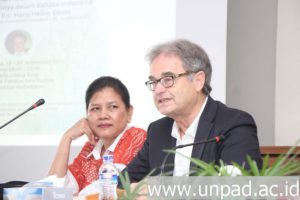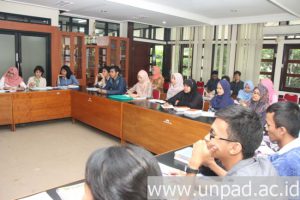[Unpad.ac.id, 19/09/2016] German Literature Study Program of Universitas Padjadjaran held a training on “Appreciation to Kinderroman Momo by Michael Ende and Its Translation to Bahasa Indonesia” in the Meeting Room of the Faculty of Cultural Science, Building A, on 19-20 September. Professor (Em.) from Johann Wolfgang Goethe-Universität Frankfurt, Germany, Prof. Dr. Dr. hc Hans-Heino Ewers.

Head of the German Literature Study Program, Universitas Padjadjaran, Dr. phil. Dian Ekawati, MA, said the training was held in order to discuss the appreciation of Indonesian readers to literature, particularly to kinderroman (children’s story) Momo by German author Michael Ende. This novel was written in 1973 and has been appreciated and translated into many languages, including Bahasa Indonesia.
In Indonesia, Momo was directly translated from German. Dian said, most books from German literature in Indonesia are translation from English. The process resulted in different translation shift in literary works.
Because it had been translated directly from German, Dian encouraged participants who were fifth-and-seventh-semester-students from German Literature, to examine more deeply related to the translation process and to appreciate the award-winning work. Appreciation by linking to the translation process is first conducted in Indonesia.
“This is kind of feedback for students on how to translate literary works in procedural process without losing the aesthetic,” Dian said when met during the training, Monday (9/19).
Dian also explained that Momo was a complex, philosophical, and political work. This study would give different perspectives, including whether the novel was suitable for children or not.
“Being written at the time when Germany was still not united, the novel is also political,” she explained.

 Prof. Hans-Heino Ewers himself is an expert on children and young adult German literature. In the training, Prof, Ewers spoke about the translation process, including historical and sociological backgrounds of Momo.
Prof. Hans-Heino Ewers himself is an expert on children and young adult German literature. In the training, Prof, Ewers spoke about the translation process, including historical and sociological backgrounds of Momo.
Through this training, Dian hoped that participants would master the techniques of translation, particularly literary works, by paying attention to the procedure and aesthetics. She also said there were not many German literary works translated into Bahasa Indonesia.
“It’s such an opportunity for the students,” said Dian.
Before giving the training, Prof. Ewers also spoke at a public lecture on the appreciation of children’s literature for teens and adults, which was held at the Center for Japanese Studies, FIB UNPAD, Friday (16/09). Referring to Prof. Ewers’s material, Dian said many children’s literary works are actually not intended for children.
On how to make a good children’s story, Prof. Ewers said that it was important to relate it to the conditions in everyday life through a child’s perspective and the story was narrated by the children. *
Reported by Arief Maulana / eh